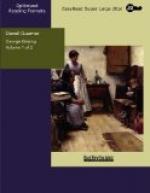“Who’s coming?” asked the young man, without looking up.
“Mr. Eustace Glazzard and Miss Glazzard.”
“Any one else?”
“Mr. Vialls.”
“Then you don’t catch me here! I have an appointment at eight.”
“I insist upon your dining with us! If you are not at dinner, I will have your allowance stopped! I mean what I say. Not one penny more shall you receive until you have learnt to behave yourself!”
“We’ll see about that,” replied Raglan, with finished coolness; and, folding his newspaper, he walked off.
Nor did the hour of dinner see his return. The expected guests arrived; it was not strictly a dinner-party, but, as Mr. Mumbray described it, “a quiet evening ong fammil.” The Rev. Scatchard Vialls carne in at the last moment with perspiring brow, excusing himself on the ground of professional duties. He was thin, yet flabby, had a stoop in the shoulders, and walked without noticeably bending his knees. The crown of his head went to a peak; he had eyes like a ferret’s; his speech was in a high, nasal note. For some years he had been a widower, a fact which perhaps accounted for his insinuating manner when he approached Miss Mumbray.
The dinner was portentously dull. Ivy Glazzard scarcely uttered a syllable. Her uncle exerted himself to shape phrases of perfect inoffensiveness, addressing now his hostess, now Serena. The burden of conversation fell upon Mr. Vialls, who was quite equal to its support; he spoke of the evil tendencies of the time as exhibited in a shameful attempt to establish Sunday evening concerts at a club of Polterham workmen. His discourse on this subject, systematically developed, lasted until the ladies withdrew. It allowed him scarcely any attention to his plate, but Mr. Vialls had the repute of an ascetic. In his buttonhole was a piece of blue ribbon, symbol of a ferocious total-abstinence; his face would have afforded sufficient proof that among the reverend man’s failings were few distinctly of the flesh.
The Mayor did not pretend to asceticism. He ate largely and without much discrimination. His variously shaped and coloured glasses were not merely for display. When the door had closed behind the Mayoress and her two companions, he settled himself with an audible sigh, and for a few moments wore a look of meditation; then, leaning towards Glazzard, he inquired gravely:
“What is your opinion of the works of Bawlzac?”
The guest was at a loss for an instant, but he quickly recovered himself.
“Ah, the French novelist? A man of great power, but—hardly according to English tastes.”
“Should you consider him suitable reading for young ladies?”
“Well, hardly. Some of his books are unobjectionable.”
Mr. Vialls shot a fierce glance at him.
“In my opinion, his very name is pollution! I would not permit a page of his writing, or of that of any French novelist, to enter my house. One and all are drenched with impurity!”




